Food for thoughts
Compliance and Regulation Law bilingual Dictionnary

The State's traditional view is that it serves the general interest through its public services, either directly (by its administrations, or even by public enterprises), or by delegation (eg through the concession mechanism). Public service is generally defined in a functional way, ie through public service missions that the organization must perform, such as providing public transport or caring for the population whatever (Eg in France by the public firm the SNCF). The liberalization of those public sectors, the primary reference to the market as a means of achieving the general interest, the primary reference to competition and the play of the European Law has destroyed this intimacy between public service, general interest, public enterprise and State.
Today, in a dialectical game, the Regulation keeps this concern for public service missions in balance with the competition, in a competitive context and under the control of a Regulator. The system is more complex and challenging because it creates new difficulties, such as information asymmetry or less easy integration of long-term planning, but it is better suited to an open and globalized economy.
Compliance and Regulation Law bilingual Dictionnary

Legally, the State is a public law subject defined by territory, people and institutions. It acts in the international space and emits norms. Politically, it has the legitimacy required to express the will of the social body and to exercise the violence of which it deprives the other subjects of law. It is often recognizable by its power: its use of public force, its budgetary power, its jurisdictional power. These three powers, declining or being challenged by private, international and more satisfying mechanisms, some predicted the disappearance of the State, to deplore it or to dance on its corpse.
With such a background, in current theories of Regulation, primarily constructed by economic thought and at first sight one might say that the State is above all the enemy. And this for two main reasons. The first is theoretical and of a negative nature. The advocates of the theory of regulation deny the State the political qualities set out above. The State would not be a "person" but rather a group of individuals, civil servants, elected officials and other concrete human beings, expressing nothing but their particular interests, coming into conflict with other interests, and using their powers to serve the former rather than the latter as everyone else. The Regulation theory, adjoining the theory of the agency, is then aimed at controlling public agents and elected representatives in whom there is no reason to trust a priori.
The second reason is practical and positive. The State would not be a "person" but an organization. Here we find the same perspective as for the concept of enterprise, which classical lawyers conceive as a person or a group of people, while economists who conceive of the world through the market represent it as an organization. The state as an organization should be "efficient" or even "optimal". It is then the pragmatic function of the Regulation Law. When it is governed by traditional law, entangled by that it would be an almost religious illusions of the general interest, or even the social contract, it is suboptimal. The Regulation purpose is about making it more effective.
To this end, as an organization, the State is divided into independent regulatory agencies or independent administrative authorities that manage the subjects as close as possible, which is fortunate in reducing the asymmetry of information and in reviving trust in a direct link. The unitary, distant and arrogant State is abandoned for a flexible and pragmatic conception of a strategic state (without capital ...) that would finally have understood that it is an organization like any other ...
Competition law adopts this conception of the State, which it posed from the beginning that it was an economic operator like any other. This is how this conception which would be more "neutral" of the world is often presented.
Successive crises, whether sanitary or financial, have produced a pendulum effect.
Now, the notions of general interest or common goods are credited of an autonomous value, and the necessity of surpassing immediate interests and of finding persons to bear superior interests or to take charge of the interests of others, even a non-immediate one, emerged.
Thus, the State or the public authority, reappears in the globalization. The Compliance Law or the Corporal Social Responsibility of the crucial companies are converging towards a consideration of the State, which can not be reduced to a pure and simple organization receptacle of externalities.
Compliance and Regulation Law bilingual Dictionnary

The notion of "Common Goods" refers to a political conception insofar as it concerns objectively commercial goods such as cultural goods or medical services, but which the community is going to demand that everyone should have access to it even though the individual does not have the ability to pay the exact price. It is then the taxpayer - present or future - or the social partners who bear the cost, or even some companies, through the corporal social social responsibility mechanism.
This protection of Common Goods can be done by the State in the name of the interest of the social group for which it is responsible and whose it expresses the will, particularly through the notion of the general interest. In this now restricted framework which is the State, this reference runs counter to the principle of competition. This is particularly clear in Europe, which is based on a Union built on an autonomous and integrated legal order in the Member States in which competition continues to have a principled value and benefits from the hierarchy of norms. The evolution of European Law has balanced the principle of competition with other principles, such as the management of systemic risks, for example health, financial or environmental risks and the creation of the banking union shows that the principle of competition is no longer an apex in the European system.
But it still remains to an economic and financial conception of Europe, definition that the definition of the Regulatory Law when it is restricted to the management of the market failures feeds. It is conceivable that Europe will one day evolve towards a more humanistic conception of Regulatory Law, the same one that the European States practice and defend, notably through the notion of public service. Indeed and traditionally, public services give people access to common goods, such as education, health or culture.
Paradoxically, even though Law is not set up on a global scale, it is at this level that the legal notion of "common goods" has developed.
When one refers to goods that are called "global goods", one then seeks goods that are common to humanity, such as oceans or civilizations. It is at once the heart of Nature and the heart of Human Being, which plunges into the past and the future. Paradoxically, the concept of "global goods" is still more political in substance, but because of a lack of global political governance, effective protection is difficult, as their political consecration can only be effective nationally or simply declaratory internationally. That is why this balance is at present only at national level, which refers to the difficulty of regulating globalization.
Thus, the "common goods" legally exist more under their black face: the "global evils" or "global ills" or "global failures", against which a "Global Law" actually takes place. The notion of "global evils" constitutes a sort of mirror of Common Goods. It is then observed that countries that develop legal discourse to regulate global evils and global goods thus deploy global unilateral national Law. This is the case in the United States, notably in financial regulatory Law or more broadly through the new Compliance Law, which is being born. Companies have a role to play, particularly through Codes of Conduct and Corporate Social Responsibility.
Thesaurus : Doctrine
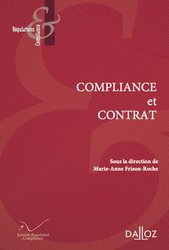
► Référence complète : M. Caffin-Moi, "L’imprégnation des branches du droit par les mécanismes de compliance : le contrat", in M.-A. Frison-Roche (dir.), Compliance et contrat, Journal of Regulation & Compliance (JoRC) et Dalloz, coll. "Régulations & Compliance", à paraître
____
📕lire une présentation de l'ouvrage, Compliance et contrat, dans lequel cet article est publié
___
► Résumé de l'article (fair par le Journal of Regulation & Compliance - JoRC) : L'auteure commence par montrer que les contrats sont de plus en plus présents dans le Droit de la Compliance, celui-ci n'étant plus ce qui est seulement exprimé par des lois d'ordre public, tandis que le contrat ne porterait que les intérêts privés de deux parties particulières. Elle expose comment concrètement aujourd'hui, et chaque jour davantage, les contrats sont utilisés comme un instrument de diffusion de la Compliance, la Vigilance étant exemplaire de cela, les textes incitant les entreprises à le faire, la CS3D mettant "le contrat à l'honneur" par la mise en place de "cascades contractuelles", le contrat agissant à la fois en surface et en profondeur.
Mais il ne faut pas que le contrat soit un moyen de restreindre la responsabilité, et l'on trouve des points de "friction" entre Contrat et Compliance.
Tout d'abord, parce que les réglementations, voire la jurisprudence, obligent les entreprises à contracter, par exemple avec des fournisseurs de rang 2, ce qui est une atteinte à la liberté de ne pas contracter.
En outre, les Buts Monumentaux de la Compliance institutionnalisent une relation contractuelle qui peut être déséquilibrée, voire engendrer une concurrence déloyale si une entreprise s'y plie et l'autre pas, la Compliance conférant de plus des prérogatives exorbitantes à l'entreprise.
Pour ne pas provoquer trop de conflits, et l'auteure souligne que le premier est certainement celui sur la compétence juridictionnelle entre le tribunal de commerce et le Tribunal judiciaire de Paris, il faut impérativement un dialogue des juges.
________
Compliance and Regulation Law bilingual Dictionnary

The goal for which a mechanism, a solution an institution or a rule is adopted, instituted or elaborated, is in principle external to them. Knowledge of this goal is a tool to better understand them and is only that.
On the contrary, in Regulation Law, the goal is the heart itself. By definition, Regulation Law is a set of instruments that articulate to take their meaning in relation to a goal. Moreover, these instruments are legitimate to represent a constraint only because they realize a goal which is itself legitimate. The interpretation of Regulation Law is based on the aims pursued: the reasoning is teleological.
This teleological nature explains that efficiency is no longer merely a concern - as for ordinary legal mechanisms, but rather a principle of Regulation Law. It explains the welcome, especially through the European Union Law of the theory of the useful effect. This link between rules, which are only means, and aims, refers to the principle of proportionality, which requires that constraints and exceptions be applied only when they are necessary, proportionality being the form off the classic principle of necessity.
Because the aim is the center, it must be expressed by the author of the Regulation standards, and this is all the more so if they are of a political nature, being not limited to mitigating technical failures of markets. This goal can be varied: the management of systemic risks, but also the consideration of the fundamental rights of people, the preservation of the environment, public health, civilization, education, etc. The silence of the legislature, which limits itself to the making of rules whereas these are merely instruments, without explicating the goal whereas the latter is a political decision, is a fault in the legislative art.
Moreover, in order that the person who applies the Regulation norm, in particular the Regulator and the Judge, has no excessive margin for interpretation and does not substitute for political power, the author of the Regulation norm needs to aim specifically for one goal : in this way, the one who applies the norm will be constrained. Or, if the author targets several purposes, then he must articulate them in relation to each other, by hierarchizing them for example. If he fails to do so, the institution which applies the regulatory standards will itself have to choose the purpose and exercise a power which he does not possess.
This express designation of purpose has been made for the European Banking Union, this Regulation and Supervision construction, whose primary aim is to prevent systemic risks and resolve crises. Similarly, the purpose of the Regulation of essentiel infrastructures is to provide third parties access to the network. Similarly, in the case of a transitional regulation introduced following liberalization, the aim is to establish competition, the principle of which has been declared by the liberalization law. When this is not clearly stated, there is a lapse in the legislative art.
Thesaurus : Doctrine

► Référence complète : M. Mekki, "Peut-on repenser la responsabilité à l’aune du devoir de Vigilance, pointe avancée de la Compliance ?", in M.-A. Frison-Roche (dir.), L'obligation de Compliance, Journal of Regulation & Compliance (JoRC) et Dalloz, coll. "Régulations & Compliance", 2024, à paraître
____
📕lire une présentation générale de l'ouvrage, L'obligation de Compliance, dans lequel cet article est publié
____
► Résumé de l'article (fait par le Journal of Regulation & Compliance - JoRC) : L'auteur développe les tensions que l'Obligation de Vigilance engendre sur le concept même de responsabilité. Répertoriant toutes les manifestations, très diverses, de la Vigilance, selon les domaines, il observe que se forme une logique téléologique de prévention et de gestion des risques systémiques, ce qu'est la compliance, sans doute remède à un État impuissant, s'appuyant sur une grande pluralité des normes.
La question est de savoir si l'on peut passer de ces droits spéciaux mais d'un esprit commun à un droit commun transformé. Les premières décisions rendues à propos de la loi de 2017 répondent par la négative, mais la question est ouverte.
Il faut alors revenir sur le concept même de responsabilité, qui pourrait accueillir un mécanisme général de Vigilance. Ce concept est très flexible et présente l'adaptabilité requise pour accueillir la logique de compliance. En effet, la responsabilité, classiquement ex post peut passer ex ante, à travers la notion de dette, non plus juridique mais éthique, car les entreprises doivent être "dignes de confiance".
La responsabilité préventive vise alors à restaurer l'équilibre des systèmes dans la poursuite des Buts Monumentaux, pour l'efficacité et l'efficience des systèmes. La responsabilité se mixte de subjectivité et d'objectivité, le risque devenant central (par rapport à la faute), le litige dépassant l'intérêt des parties, la remédiation devenant le sujet central dans un procès en responsabilité à repenser : le dialogue doit y être au centre, entre les juridictions, entre les entreprises et les parties prenantes, dans un office du juge adapté.
________
Compliance and Regulation Law bilingual Dictionnary
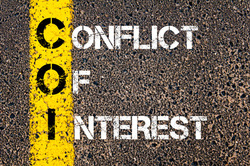
Paradoxically, the notion of conflict of interest seems to be at the center of Economic Law only recently in Economic Law, in both Corporate and Public Law. This is due to the philosophy which animates these two branches of Law, very different for each, and which has changed in each.
In fact, and in the first place in Public Law, in the Continental legal systems and especially in French legal tradition, on the side of the State, the one who serves it, by a sort of natural effect,, makes the general interest incarnated by the State pass before its personal interest. There is an opposition of interests, namely the personal interest of this public official who would like to work less and earn more, and the common interest of the population, who would like to pay less taxes and for example benefit trains that always arrive on time and the general interest which would be for example the construction of a European rail network.
But this conflict would be resolved "naturally" because the public official, having "a sense of the general interest" and being animated by the "sense of public service", sacrifices himself to serve the general interes. He stays late at his office and gets the trains on time. This theory of public service was the inheritance of royalty, a system in which the King is at the service of the People, like the aristocracy is in the "service of the King." There could therefore be no conflict of interest, neither in the administration nor in the public enterprises, nor to observe, manage or dissolve. The question does not arise ...
Let us now take the side of the companies, seen by the Company Law. In the classical conception of corporate governance, corporate officers are necessarily shareholders of the company and the profits are mandatorily distributed among all partners: the partnership agreement is a "contract of common interest". Thus, the corporate officer works in the knowledge that the fruits of his efforts will come back to him through the profits he will receive as a partner. Whatever its egoism - and even the agent must be, this mechanism produces the satisfaction of all the other partners who mechanically will also receive the profits. Selfishness is indeed the motor of the system, as in the classical theory of Market and Competition. Thus, in the corporate mechanism, there is never a conflict of interest since the corporate officer is obligatorily associated: he will always work in the interest of the partners since in this he works for himself. As Company Law posits that the loss of the company will also be incurred and suffered by all partners, he will also avoid this prospect. Again, there is no need for any control. The question of a conflict of interest between the mandatary and those who conferred this function does not structurally arise...
These two representations both proved inaccurate. They were based on quite different philosophies - the public official being supposed to have exceeded his own interest, the corporate officer being supposed to serve the common interest or the social interest by concern for his own interest - but this was by a unique reasoning that these two representations were defeated.
Let us take the first on Public Law: the "sense of the State" is not so common in the administration and the public enterprises, that the people who work there sacrifice themselves for the social group. They are human beings like the others. Researchers in economics and finance, through this elementary reflection of suspicion, have shattered these political and legal representations. In particular, it has been observed that the institutional lifestyle of public enterprises, very close to the government and their leaders, is often not very justified, whereas it is paid by the taxpayer, that is, by the social group which they claimed to serve. Europe, by affirming in the Treaty of Rome the principle of "neutrality of the capital of enterprises", that is to say, indifference to the fact that the enterprise has as its shareholder a private person or a public person, validated this absence of exceeding of his particular interest by the servant of the State, become simple economic agent. This made it possible to reach the conclusion made for Company Law.
Disillusionment was of the same magnitude. It has been observed that the corporate officer, ordinary human being, is not devoted to the company and does not have the only benefit of the profits he will later receive as a partner. He sometimes gets very little, so he can receive very many advantages (financial, pecuniary or in kind, direct or indirect). The other shareholders see their profits decrease accordingly. They are thus in a conflict of interest. Moreover, the corporate officer was elected by the shareholders' meeting, that is to say, in practice, the majority shareholder or the "controlling" shareholder (controlling shareholder) and not by all. He may not even be associated (but a "senior officer").
The very fact that the situation is no longer qualified by lawyers, through the qualifications of classical Company Law, still borrowing from the Civil Contract Law, the qualifications coming more from financial theories, borrowing from the theory of the agency, adically changed the perspective. The assumptions have been reversed: by the same "nature effect", the conflict of interest has been disclosed as structurally existing between the manager and the minority shareholder. Since the minority shareholder does not have the de facto power to dismiss the corporate officer since he does not have the majority of the voting rights, the question does not even arise whether the manager has or has not a corporate status: the minority shareholder has only the power to sell his securities, if the management of the manager is unfavorable (right of exit) or the power to say, protest and make known. This presupposes that he is informed, which will put at the center of a new Company Law information, even transparency.
Thus, this conflict of interests finds a solution in the actual transfer of securities, beyond the legal principle of negotiability. For this reason, if the company is listed, the conflict of interest is translated dialectically into a relationship between the corporate officer and the financial market which, by its liquidity, allows the agent to be sanctioned, and also provides information, Financial market and the minority shareholder becoming identical. The manager could certainly have a "sense of social interest", a sort of equivalent of the state's sense for a civil servant, if he had an ethics, which would feed a self-regulation. Few people believe in the reality of this hypothesis. By pragmatism, it is more readily accepted that the manager will prefer his interest to that of the minority shareholder. Indeed, he can serve his personal interest rather than the interest for which a power has been given to him through the informational rent he has, and the asymmetry of information he enjoys. All the regulation will intervene to reduce this asymmetry of information and to equip the minority shareholder thanks to the regulator who defends the interests of the market against the corporate officers, if necessary through the criminal law. But the belief in managerial volunteerism has recently taken on a new dimension with corporate social responsability, the social responsibility of the company where managers express their concern for others.
The identification of conflicts of interests, their prevention and their management are transforming Financial Regulatory Law and then the Common Law of Regulation, because today it is no longer believed a priori that people exceed their personal interest to serve the interest of others. It is perhaps to regain trust and even sympathy that companies have invested in social responsibility. The latter is elaborated by rules which are at first very flexible but which can also express a concern for the general interest. In this, it can meet Compliance Law and express on behalf of the companies a concern for the general interest, if the companies provide proof of this concern.
To take an example of a conflict of interest that resulted in substantial legal changes, the potentially dangerous situation of credit rating agencies has been pointed out when they are both paid by banks, advising them and designing products, While being the source of the ratings, the main indices from which the investments are made. Banks being the first financial intermediaries, these conflicts of interest are therefore systematically dangerous. That is why in Europe ESMA exercises control over these rating agencies.
The identification of conflicts of interest, which most often involves changing the way we look at a situation - which seemed normal until the point of view changes - the moral and legal perspective being different, Trust one has in this person or another one modifying this look, is today what moves the most in Regulation Law.
This is true of Public and Corporate Law, which are extended by the Regulation Law, here itself transformed by Compliance Law, notably by the launchers of alerts. But this is also true that all political institutions and elected officials.
For a rule emerges: the more central the notion of conflict of interest becomes, the more it must be realized that Trust is no longer given a priori, either to a person, to a function, to a mechanism, to a system. Trust is no longer given only a posteriori in procedures that burden the action, where one must give to see continuously that one has deserved this trust.
Compliance and Regulation Law bilingual Dictionnary

The Independent Administrative Authority (IAA) is the legal form that the legislator has most often chosen to build regulatory authorities. The IAA is only its legal form, but French law has attached great importance to it, following the often formalistic tradition of public law. They are thus independent administrative authorities, especially in the legal systems of continental law like France, Germany or Italy.
The essential element is in the last adjective: the "independent" character of the organism. This means that this organ, which is only administrative so has a vocation to be placed in the executive hierarchy, does not obey the Government. In this, regulators have often been presented as free electrons, which posed the problem of their legitimacy, since they could no longer draw upstream in the legitimacy of the Government. This independence also poses the difficulty of their responsibility, the responsibility of the State for their actions, and the accountability of their use of their powers. Moreover, the independence of regulators is sometimes questioned if it is the government that retains the power to appoint the leaders of the regulatory authority. Finally, the budgetary autonomy of the regulator is crucial to ensure its independence, although the authorities having the privilege of benefiting from a budget - which is not included in the LOLF - are very few in number. They are no longer referred to as "independent administrative authorities" but as "Independent Public Authorities", the legislator making a distinction between the two (French Law of 20 January 2017).
The second point concerns the second adjective: that it is an "administrative" body. This corresponds to the traditional idea that regulation is the mechanism by which the State intervenes in the economy, in the image of a kind of deconcentration of ministries, in the Scandinavian model of the agency. If we allow ourselves to be enclosed in this vocabulary, we conclude that this administrative body makes an administrative decision which is the subject of an appeal before a judge. Thus, in the first place, this would be a first instance appeal and not a judgment since the administrative authority is not a court. Secondly, the natural judge of the appeal should be the administrative judge since it is an administrative decision issued by an administrative authority. But in France the Ordinance of 1 December 1986 sur la concurrence et la libéralisation des prix (on competition and price liberalization), because it intended precisely to break the idea of an administered economy in order to impose price freedom on the idea of economic liberalism, required that attacks against the decisions of economic regulators taking the form of IAA are brought before the Court of Appeal of Paris, judicial jurisdiction. Some great authors were even able to conclude that the Paris Court of Appeal had become an administrative court. But today the procedural system has become extremely complex, because according to the IAA and according to the different kinds of decisions adopted, they are subject to an appeal either to the Court of Appeal of Paris or to the Conseil d'État (Council of State) . If one observes the successive laws that modify the system, one finds that after this great position of principle of 1986, the administrative judge gradually takes again its place in the system, in particular in the financial regulation. Is it logical to conclude that we are returning to a spirit of regulation defined as an administrative police and an economy administered by the State?
Finally, the third term is the name itself: "authority". It means in the first place an entity whose power holds before in its "authority". But it marks that it is not a jurisdiction, that it takes unilateral decisions. It was without counting the European Court of Human Rights (ECHR) and the judicial judge! Indeed, Article 6§1 of the European Convention on Human Rights states that everyone has the right to an impartial tribunal in civil and criminal matters. The notion of "criminal matter" does not coincide with the formal traditional concept of criminal law but refers to the broad and concrete factual concept of repression. Thus, by a reasoning which goes backwards, an organization, whatever the qualification that a State has formally conferred on it, which has an activity of repression, acts "in criminal matters". From this alone, in the European sense, it is a "tribunal". This automatically triggers a series of fundamental procedural guarantees for the benefit of the person who is likely to be the subject of a decision on his part. In France, a series of jurisprudence, both of the Cour de cassation (Court of Cassation), the Conseil d'État (Council of State) or the Conseil constitutionnel (Constitutional Council) has confirmed this juridictionnalization of the AAI.
June 12, 2024
Editorial responsibilities : Direction of the collection "Regulations & Compliance", JoRC & Dalloz

🌐follow Marie-Anne Frison-Roche on LinkedIn
🌐subscribe to the Newsletter MAFR. Regulation, Compliance, Law
____
► Full Reference: M.-A. Frison-Roche (dir.), L'Obligation de Compliance, coll."Régulations & Compliance", Journal of Regulation & Compliance (JoRC) and Dalloz, to be published.
____
📘 At the same time, a book in English, Compliance Obligation, is published in the collection copublished by the Journal of Regulation & Compliance (JoRC) and the Éditions Bruylant.
____
🧮the book follows the cycle of colloquia 2023 organised by the Journal of Regulation & Compliance (JoRC) and its Universities partners.
____
📚this volume is one of a series of books devoted to Compliance in this collection.
► read the presentations of the other books:
- further books:
🕴️M.-A. Frison-Roche (ed.), 📕Le système probatoire de la Compliance, 2025
- previous books:
🕴️M.-A. Frison-Roche & M. Boissavy (eds.), 📕Compliance et droits de la défense. Enquête interne - CJIP - CRPC, 2023
🕴️M.-A. Frison-Roche (ed.), 📕La juridictionnalisation de Compliance, 2023
🕴️M.-A. Frison-Roche (ed.), 📕Les Buts Monumentaux de la Compliance, 2022
🕴️M.-A. Frison-Roche (ed.), 📕Les outils de la Compliance, 2021
🕴️M.-A. Frison-Roche (ed.), 📕Pour une Europe de la Compliance, 2019
🕴️N. Borga, 🕴️J.-Cl. Marin and 🕴️J.-Ch. Roda (eds.), 📕Compliance : l'Entreprise, le Régulateur et le Juge, 2018
🕴️M.-A. Frison-Roche (ed.), 📕Régulation, Supervision, Compliance, 2017
🕴️M.-A. Frison-Roche (ed.), 📕Internet, espace d'interrégulation, 2016
📚see the global presentation of all the books of the collection.
___
► General presentation of this book: Compliance is sometimes presented as an inescapable mechanism , which is tantamount to seeing it as the legal Obligation par excellence, Criminal Law being its most appropriate mode of expression. But this is not so obvious. Moreover, it is becoming difficult to unify all Compliance Tools, which encompass moral representations of the world, and even cultures specific to each company, so that Law can only produce incentives or produce soft law. As a result, Compliance Obligation appears as very difficult to define.
These hesitations reflect the youth of this Compliance Law under construction. Identified through juxtaposed special laws, for each of which specialists have come forward, it is nonetheless taking shape with its own normativity, anchored in its Monumental Goals. Because the notion of Obligation is as old as Law itself, the Obligation of Compliance is confronted with all the branches of Law, and more particularly, with all due respect, with Contract and Tort Law.
But Compliance has long been a practice, effectiveness, efficacy and efficiency being among its principles. How can all these ambitious declarations be put into effect? Is there not a hint of a gap between the grandiloquence of this declared Compliance Obligation and what actually happens? The practical question of how to compel is, in this new branch of Law, a question of law.
In order to have a more accurate perception of the Obligation of Compliance and therefore to better measure its future, it is advisable to end up taking its Advanced Point, which is the Obligation of Vigilance, clearer and stronger than the other instruments, having Monumental Goals, placing the Judge more clearly at the centre, developing in an already more visible way the power of this Obligation of Compliance which abstracts itself as necessary from borders and claims to express sovereignties.
____
🏗️general construction of this Book: The book opens with a double Introduction. The first, which is freely accessible, consists of a summary of the book, while the second, which is substantial, deals with the unified conception that we can, and indeed should, have, of the "Compliance Obligation", without losing the concrete and active character that characterises this branch of law.
The first Part of the book aims to define the Compliance Obligation. To this end, Chapter I deals with the Nature of this obligation. Chapter II deals with the Spaces of the Compliance Obligation.
The Part II aims to articulate the Compliance Obligation with other branches of Law.
The Part III of the book looks at the way in which the possibility of obliging and the means of obliging are provided. To this end, Chapter I deals with the Convergence of the Sources of the Compliance Obligation. Chapter II considers International Arbitration as a reinforcement of the Compliance Obligation. To this end, Chapter I deals with the Convergence of the Sources of the Compliance Obligation. Chapter II considers International Arbitration as a reinforcement of the Compliance Obligation.
The last Part of the book is devoted to Vigilance, the leading edge of the Compliance Obligation. Chapter I is devoted to a study of the various sectors, and analyses the Intensities of the Vigilance Obligation. Chapter II deals with the Variations in Tension generated by the Vigilance Obligation. Finally, Chapter III deals with the New Modalities of the Compliance Obligation, highlighted by the Vigilance Imperative.
____
TABLE OF CONTENTS
L’OBLIGATION DE COMPLIANCE : VISION D’ENSEMBLE
(COMPLIANCE OBLIGATION : OVERVIEW)
Section 1 ♦️ Lignes de force de l’ouvrage L'Obligation de Compliance (Main Aspects of the Book L'Obligation de Compliance), by 🕴️Marie-Anne Frison-Roche
Section 2 ♦️ Concevoir l’unicité de l’Obligation de Compliance sans la diluer (Conceiving the unicity of the Compliance Obligation without diluting it), by 🕴️Marie-Anne Frison-Roche
TITRE I.
CERNER L’OBLIGATION DE COMPLIANCE
(IDENTIFYING THE COMPLIANCE OBLIGATION)
CHAPITRE I : LA NATURE DE L’OBLIGATION DE COMPLIANCE
(CHAPTER I: THE NATURE OF THE COMPLIANCE OBLIGATION)
Section 1 ♦️ La Volonté, le Cœur et le Calcul (Will, Heart and Calculation), by 🕴️Marie-Anne Frison-Roche
Section 2 ♦️ La dette, notion économique comme fondement de l'Obligation de Compliance (Debt, an economic concept underpinning the Compliance Obligation), by 🕴️Bruno Deffains
Section 3 ♦️ Obligation de Compliance et droits humains (Compliance Obligation and Human Rights), by 🕴️Jean-Baptiste Racine
Section 4 ♦️ Les mutations de la souveraineté et l'Obligation de Compliance (Changes in Sovereignty and the Compliance Obligation), by 🕴️René Sève
CHAPITRE II : LES ESPACES DE L’OBLIGATION DE COMPLIANCE (SPACES OF THE COMPLIANCE OBLIGATION)
Section 1 ♦️ Entités industrielles et Obligation de Compliance (Industrial entities and Compliance Obligation), by 🕴️Etienne Maclouf
Section 2 ♦️ L'Obligation de Compliance dans les chaînes de valeur (The Compliance Obligation in Value Chains), by 🕴️Lucien Rapp
Section 3 ♦️ Compliance et conflits de lois. Le droit international de la vigilance-conformité (Compliance and conflict of laws. International Law of Vigilance-Conformity), by 🕴️Louis d'Avout
TITRE II.
ARTICULER L’OBLIGATION DE COMPLIANCE AVEC DES BRANCHES DU DROIT
(ARTICULATING THE COMPLIANCE OBLIGATION WITH BRANCHES OF LAW)
Section 1 ♦️ Dimensions constitutionnelles de l'Obligation de Compliance (Constitutional dimensions of the Compliance Obligation), by 🕴️Stéphane Mouton
Section 2 ♦️ Droit fiscal et Obligation de Compliance (Tax Law and Compliance Obligation), by 🕴️Daniel Gutmann
Section 3 ♦️ Le droit processuel, prototype de l'Obligation de Compliance (General Procedural Law, prototype of the Compliance Obligation), by 🕴️Marie-Anne Frison-Roche
Section 4 ♦️ Le droit des sociétés et des marchés financiers face à l'Obligation de Compliance (Corporate and Financial Markets Law facing the Compliance Obligation), by 🕴️Anne-Valérie Le Fur
Section 5 ♦️ Le rapport entre le Droit de la responsabilité civile et l'Obligation de Compliance (The link between Tort Law and Compliance Obligation), by 🕴️Jean-Sébastien Borghetti
Section 6 ♦️ Dimensions environnementales et climatiques de l'Obligation de Compliance (Environmental and Climatic Dimensions of the Compliance Obligation), by 🕴️Marta Torre-Schaub
Section 7 ♦️ Droit de la concurrence et Droit de la Compliance (Competition Law and Compliance Law), by 🕴️Jean-Christophe Roda
Section 8 ♦️ L'Obligation de Compliance en Droit global (The Compliance Obligation in Global Law), by 🕴️Benoît Frydman & 🕴️Alice Briegleb
Section 9 ♦️ Transformation des relations de travail et obligation de vigilance (Transformation of Labour Relations and Vigilance Obligation), by 🕴️Stéphane Vernac
Section 11 ♦️ Juge du droit des entreprises en difficulté et obligations de compliance (Judge of Insolvency Law and Compliance Obligations), by 🕴️Jean-Baptiste Barbièri
TITRE III.
COMPLIANCE : DONNER ET SE DONNER LES MOYENS D’OBLIGER
(COMPLIANCE : GIVE AND TAKE THE MEANS TO OBLIGE)
CHAPITRE I : LA CONVERGENCE DES SOURCES (CONVERGENCE OF SOURCES)
Section 1 ♦️ L’Obligation de Compliance, entre volonté et consentement : obligation sur obligation vaut (Compliance Obligation, between Will and Consent: obligation upon obligation works), by 🕴️Marie-Anne Frison-Roche
Section 2 ♦️ Ce qu'est un engagement (What a Commitment is), by 🕴️Marie-Anne Frison-Roche
Section 3 ♦️ Les technologies disponibles, prescrites ou proscrites pour satisfaire Compliance et Vigilance (Technologies available, prescribed or prohibited to meet Compliance and Vigilance requirements), by 🕴️Emmanuel Netter
Section 4 ♦️ La cybersécurité et l’Obligation de Compliance (Cybersecurity and Compliance Obligation), by 🕴️Michel Séjean
Section 5 ♦️ La place de l’espoir dans l’aptitude à appréhender l’avenir (The Place of Hope in the Ability to Apprehend the Future), by 🕴️
Section 6 ♦️ Contrainte légale et stratégie des entreprises en matière de Compliance (Legal Constraint and Company Strategies in Compliance matters), by 🕴️Jean-Philippe Denis & Nathalie Fabbe-Costes
Section 7 ♦️ La loi, source de l’Obligation de Compliance (The law, source of the Compliance Obligation), by 🕴️Jean-Baptiste Blanc
Section 8 ♦️ Opposition ou convergence des systèmes juridiques dans les règles et cultures de compliance (Opposition or Convergence of Legal Systems in Compliance Rules and Cultures), by 🕴️Raphaël Gauvain & 🕴️Blanche Balian
CHAPITRE II : L’ARBITRAGE INTERNATIONAL EN RENFORT DE L’OBLIGATION DE COMPLIANCE (INTERNATIONAL ARBITRATION IN SUPPORT OF THE COMPLIANCE OBLIGATION)
Section 1 ♦️ Le renforcement des engagements de Compliance par le renvoi Ex Ante à l’arbitrage international (Reinforcing Compliance Commitments by referring Ex Ante to International Arbitration"), by
Section 2 ♦️ La condamnation en nature par le tribunal arbitral, renfort de l’Obligation de Compliance (The Arbitral Tribunal's Award in Kind, in support of the Compliance Obligation), by 🕴️Eduardo Silva Romero
Section 3 ♦️ L’usage de l’arbitrage international pour renforcer l’obligation de Compliance : l’exemple du secteur de la construction (The use of International Arbitration to reinforce the Compliance Obligation: the example of the construction sector), by 🕴️Christophe Lapp & 🕴️Jean-François Guillemin
Section 4 ♦️ L’arbitre, juge, superviseur, accompagnateur ? (The Arbitrator, Judge, Supervisor, Support) , by 🕴️Jean-Baptiste Racine
Section 5 ♦️ L’arbitre, organe indirect et direct de l’Obligation de Compliance ? (The Arbitrator, indirect and direct agent of the Compliance Obligation?), by 🕴️Laurent Aynès
TITRE IV.
LA VIGILANCE, POINTE AVANCÉE DE L’OBLIGATION DE COMPLIANCE
(VIGILANCE, SPEARHEAD OF THE COMPLIANCE OBLIGATION)
CHAPITRE I : LES INTENSITÉS DE L’OBLIGATION DE VIGILANCE, POINTE AVANCÉE DU SYSTÈME DE COMPLIANCE (INTENSITIES OF THE VIGILANCE OBLIGATION, SPEARHEAD OF THE COMPLIANCE SYSTEM)
Section 1 ♦️ Articulation systémique entre Vigilance, Due Diligence, conformité et Compliance : la Vigilance, part totale de l'Obligation de Compliance (Systemic Articulation between Vigilance, Due Diligence, Conformity and Compliance: Vigilance, Total Share of the Compliance Obligation), by 🕴️Marie-Anne Frison-Roche
Section 2 ♦️ L’intensité de l’Obligation de Vigilance selon les secteurs : le cas des opérateurs financiers (Intensity of the Vigilance Obligation by Sectors: the case of Financial Operators), by 🕴️Anne-Claire Rouaud
Section 3 ♦️ L’intensité de l’Obligation de Vigilance selon les secteurs : le cas des opérateurs bancaires et d’assurance (Intensity of the Vigilance Obligation by Sectors: the case of Banking and Insurance Operators), by 🕴️Mathieu Françon
Section 4 ♦️ L’intensité de l’Obligation de Vigilance selon les secteurs : le cas des opérateurs numériques (Intensity of the Vigilance Obligation by Sectors: the case of Digital Operators), by 🕴️Grégoire Loiseau
Section 5 ♦️ L’intensité de l’Obligation de Vigilance selon les secteurs : le cas des opérateurs énergétiques (Intensity of the Vigilance Obligation by Sectors: the case of Energy Operators), by 🕴️Marie Lamoureux
CHAPITRE II : LES VARIATIONS DE TENSIONS ENGENDRÉES PAR L’OBLIGATION DE VIGILANCE, POINTE AVANCÉE DU SYSTÈME DE COMPLIANCE (VARIATIONS OF TENSIONS GENERATED BY THE VIGILANCE OBLIGATION, SPEARHEAD OF THE COMPLIANCE SYSTEM)
Section 1 ♦️ Repenser le concept de responsabilité civile à l’aune du devoir de vigilance, pointe avancée de la compliance (Rethinking the Concept of Civil Liability in the light of the Duty of Vigilance, Spearhead of Compliance), by 🕴️Mustapha Mekki
Section 2 ♦️ Transformation de la gouvernance et obligation de Vigilance (Transformation of Governance and Vigilance Obligation), by 🕴️Véronique Magnier
CHAPITRE III : LES MODALITÉS NOUVELLES DE L'OBLIGATION DE COMPLIANCE, MISES EN LUMIÈRE PAR L'IMPÉRATIF DE VIGILANCE (NEW MODALITIES OF THE COMPLIANCE OBLIGATION, HIGHLIGHTED BY THE VIGILANCE IMPERATIVE)
Section 1 ♦️ La façon dont l'impératif de Vigilance s'ajuste aux règles juridiques internationales (How the Vigilance Imperative fits in with International Legal Rules), by 🕴️Bernard Haftel
Section 2 ♦️ Contrats et clauses, mise en œuvre et modalités de l’Obligation de Vigilance (Contracts and clauses, implementation and modalities of the Vigilance Obligation), by 🕴️Gilles J. Martin
Section 3 ♦️ La preuve de la bonne exécution de la Vigilance au regard du système probatoire de Compliance (Proof that Vigilance has been properly carried out with regard to the Compliance Evidence System), by 🕴️Jean-Christophe Roda
TITRE V.
LE JUGE ET L'OBLIGATION DE COMPLIANCE
(THE JUDGE AND THE COMPLIANCE OBLIGATION)
Section 1 ♦️ Les enjeux présents à venir de l’articulation des principes de procédure civile et commerciale avec la logique de compliance (Present and Future Challenges of Articulating Principles of Civil and Commercial Procedure with the Logic of Compliance), by 🕴️Thibault Goujon-Bethan
Section 2 ♦️ La médiation, voie d'avenir pour une Obligation de Compliance effective (Mediation, the way forward for an Effective Compliance Obligation), by 🕴️Malik Chapuis
Section 3 ♦️ Le Juge requis pour une Obligation de Compliance effective (The Judge required for an Effective Compliance Obligation), by 🕴️Marie-Anne Frison-Roche
________
Feb. 1, 2024
Teachings
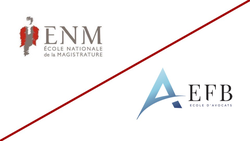
🌐follow Marie-Anne Frison-Roche on LinkedIn
🌐subscribe to the Newsletter MAFR Regulation, Compliance, Law
____
► Full Reference: F. Ancel & M.-A. Frison-Roche, Droit de la compliance (Compliance Law), École nationale de la magistrature - ENM (French National School for the Judiciary), in collaboration with the École de Formation professionnelle des Barreaux du ressort de la cour d'appel de Paris - EFB (Paris Bar School), Paris, February 1 and 2, 2024
This teaching is given in French.
____
____
► Presentation of the Teaching: The aim of this two-day conference is to enable judges and lawyers to grasp the issues, objectives and methods that define Compliance Law as it is practised in companies.
The speakers will illustrate the growing trend towards litigation, which is difficult to reconcile with the supranational dimension, or even indifference to territories, for example when disputes concern systemic climate or digital issues: the result is a renewal of the role of the judge and the role of lawyers.
This must be set against the renewal of the role and operation of companies themselves.
This is analysed from the perspective of Civil Law, in particular Contract Law and Liability Law. Company Law and Criminal Law are also addressed, as well as the way in which the legal system now integrates governance, regulation, climate and digital issues and the smooth operation of financial markets through Compliance techniques.
____
► Organisation of the Teaching: This conference is divided into two parts.
The first day is designed as a presentation of the major themes through which Compliance Law crosses the branches of traditional Law. The speakers will be professors of Law who will successively summarise the branches of Law and put into perspective the way in which Compliance imperatives give rise to new situations, new difficulties and new solutions.
This enables the second day to focus on practical and topical issues and to debate controversial questions between people of different sensibilities. The participants tend to be judges, members of regulatory authorities, lawyers, members of associations and so on.
____
► Enrolment procedure: The course is open to all judicial and consular magistrates, as well as lawyers.
Registrations can be made directly with the ENM or with the EFB.
____
► Speakers :
🎤François Ancel, Judge at the Première Chambre civile de la Cour de cassation (First Civil Chamber of the French Court of cassation)
🎤Thomas Baudesson, Attorney at the Paris Bar, Partner at Clifford Chance
🎤Guillaume Beaussonie, Full Professor at Toulouse 1 Capitole University
🎤Jacques Boulard, Premier Président de la Cour d’appel de Paris (First President of the Paris Court of Appeal)
🎤Marie Caffin-Moi, Full Professor at Paris Panthéon-Assas University
🎤Malik Chapuis, Judge at the Tribunal judiciaire de Paris (Paris First Instance Civil Court)
🎤Lucie Chatelain, Advocacy and Litigation Manager - Civil Liability of Parent Companies, Sherpa
🎤Jean-Benoît Devauges, Directeur Juridique, Ethique et Gouvernance des entreprises (Legal, Ethics and enterprises governance Director), MEDEF
🎤Marie-Anne Frison-Roche, Professor of Regulatory and Compliance Law, Director of the Journal of Regulation & Compliance (JoRC)
🎤Arnaud Gossement, Attorney at the Paris Bar, Partner at Gossement Avocats
🎤Thibault Goujon-Bethan, Full Professor at Jean Moulin Lyon 3 University
🎤Christophe Ingrain, Attorney at the Paris Bar, Partner at Darrois Villey Maillot Brochier
🎤Isabelle Jegouzo, Director of the Agence française anticorruption - AFA (French Anti-Corruption Agency)
🎤Anne-Valérie Le Fur, Full Professor at Versailles Saint-Quentin-en-Yvelines University
🎤Charlotte Michon, Attorney at the Paris Bar, partner at Charlotte Michon Avocat
🎤Jean-Baptiste Racine, Full Professor at Paris Panthéon-Assas University
🎤 Jean-Christophe Roda, Full Professor at Jean-Moulin Lyon 3 University
🎤Jérôme Simon, 1er Vice-Procureur Financier (First Financial Vice-Prosecutor)
____
🧮read below the programme put together and organised by François Ancel and Marie-Anne Frison-Roche, as well as the reports of each presentation⤵️

Jan. 22, 2024
Public Auditions

🌐suivre Marie-Anne Frison-Roche sur LinkedIn
🌐s'abonner à la Newsletter MAFR Regulation, Compliance, Law
____
► Référence complète : M.-A. Frison-Roche, audition notamment par Maître Sophie Bonne et Maître Anne-Claire Ancelin, respectivement présidente et rapporteure de la Commission du Conseil Supérieur du Notariat (CSN), élaborant un rapport sur Compliance : un espace à conquérir ?, 22 janvier 2024, CSN, Paris..
____
► Résumé de la présentation : j'ai eu l'occasion d'étudier et de discuter des relations entre le notaire comme professionnel et le notariat comme structure de régulation d'une part et le Droit de la Compliance, d'autre part.
Je l'ai fait lors des travaux du Conseil Supérieur du Notariat sur la raison d'être, dans une audition avec la Commission du CSN en charge de la réflexion à ce propos et et d'une façon plus générale à propos de l'articulation entre l'office du notariat et les mécanismes juridiques de régulation, car le Droit de la Compliance est le prolongement du Droit de la Régulation. J'ai d'ailleurs à ce titre fait une masterclass sur le droit de la compliance lors du Congrès annuel de 2022 à ce sujet.
M'appuyant sur ces premières réflexions et discussions, je peux articuler les propos suivants:
0. Observation préalable : l'intitulé semble sous-entendre que la compliance serait un espace nouveau, où le notariat serait étranger et qu'il faudrait "conquérir" cette terra incognita , le point d'interrogation permettant de suggérer que, si nouveau soit le Droit de la Compliance, c'est plutôt dans les professions agissant en Ex Ante qu'il est le moins "étranger" et que l'espace est donc déjà le plus "naturel".
L'enjeu est plutôt dans l'ambition que l'on peut en avoir : soit une ambition faible ("conformité"), soit une ambition forte ("Droit de la Compliance").
1. Un espace restreint aujourd'hui et plus encore demain si l'on réduit la Compliance à ce qui n'est que son outil : la conformité. Cette réduction équivaut à un grand dommage, car les algorithmes sont aptes à prendre en charge la conformité, et font le faire le plus en plus, tandis que la compliance est maniée par les êtres humains. La conformité est, mais n'est que, un outil de la Compliance.
2. La Compliance se définit par les Buts Monumentaux
- Les Buts monumentaux sont fixés par les Autorités politiques et publiques et ne peuvent être fixés que par elles ; le déploiement des moyens peuvent être déploient par d'autres que l'administration
3. Pragmatiquement, les buts monumentaux unifient la "masse réglementaire"
4. Tendre, dans une trajectoire, vers eux nécessite des êtres humains qui se coordonnent et agissent ensemble (ensemble du modèle concurrentiel)
5. Ils constituent la Compliance comme une branche ex ante du Droit
6. Ils placent le Droit de la Compliance en déploiement du Droit de la Régulation
7. Le Notariat est alors tout d'abord un "agent d'effectivité de la conformité", se dotant pour cela notamment des outils algorithmiques
8. Le Notariat est aussi une profession humaniste qui aide l'Etat, les entreprises et les parties intéressées à tendre vers la protection des êtres humains, pour qu'ils ne soient pas broyés par les systèmes devenus plus menaçants (but monumental négatif) et qu'ils en bénéficient (but monumental positif)
9. En cela, le Notariat, comme le Juge et l'Avocat, doit être consolidé dans sa structure, et doit aussi se présenter, au niveau du professionnel, au niveau de l'étude, au niveau de la profession structurée
10. Le Notariat doit aussi conforter sa gouvernance dans ce nouveau système de Compliance qui est en lien avec l'Etat de Droit et la Démocratie.
____
► Voir dans mes travaux ceux qui peuvent présenter un intérêt au regard de cette audition ⤵️
🕴️M.-A. Frison-Roche, 🖥️Appliquer la notion de "Raison d'être à la profession du Notariat, 2021
🕴️M.-A. Frison-Roche,🎤La compliance pour les études notariales : aspects théoriques et pratiques, Congrès des notaires , 2022
🕴️M.-A. Frison-Roche,📝Notariat et régulation font bon ménage, 2015
🕴️M.-A. Frison-Roche, 💬La profession investit le Droit de la Compliance et détermine sa Raison d'Etre, 2023
🕴️M.-A. Frison-Roche (dir.), 📕Les Buts Monumentaux de la Compliance, 2022
🕴️M.-A. Frison-Roche, 📝Penser et manier la Vigilance par ses Buts Monumentaux de Compliance, mars 2023.
🕴️M.-A. Frison-Roche, 📝Contrat de compliance, clauses de compliance, 2022.
🕴️M.-A. Frison-Roche, 🚧L'invention de la vigilance : un terme nouveau pour une Responsabilité en Ex Ante, 2021.
🕴️M.-A. Frison-Roche, 📝Synthèse : Le rôle du juge dans le déploiement du droit de la régulation par le droit de la compliance, à paraître
🕴️M.-A. Frison-Roche, 📝Le Droit de la compliance, 2016.
________
Jan. 17, 2024
Editorial responsibilities : Direction of the collection "Cours-Série Droit privé", Editions Dalloz (33)

► Full Reference: J.-D. Pellier, Droit de la consommation (Consummer Law), 4th ed., Dalloz, "Cours Dalloz-Série Droit privé" Serie, 2024, 512 p.
____
► General presentation of the book: Le Droit de la consommation est récent mais nous le vivons chaque jour. Il a été refondu en 2016. Il exprime aussi une nouvelle façon de concevoir le droit civil, le droit commercial, le droit pénal et le droit public. Voilà bien des raisons d'apprendre et de comprendre le "Droit de la consommation" grâce à ce manuel clair et à jour.
____
📕read the back cover (in French)
____
📕read the back cover of the 1st edition (in French)
____
📕read the table of contents (in French)
____
📚see the entire "Cours - droit privé" Serie
________
Jan. 12, 2024
Thesaurus : Doctrine
► Référence complète : M. Mekki, "Pour une compliance notariale", JCP N, n° 01-02, 12 janvier 2024, étude n° 1000, pp. 31-34
____
► Résumé de l'article (fait par l'auteur) : "Le droit est souvent appréhendé sous l'angle des risques qu'il crée ou qu'il canalise, cadre dans lequel la logique de compliance, outils de prévention et de gestion des risques systémiques, se déploie de manière exponentielle. Dans ce contexte, le notaire s'impose, en sa qualité d'officier public et ministériel, comme un acteur privilégié non seulement pour conseiller les entreprises qui s'engagent dans cette démarche proactive de compliance, mais également et surtout en sa qualité de gardien, Gatekeeper, enrichissant le service public de la sécurité juridique et numérique d'une nouvelle mission : contribuer à prévenir et à gérer les risques systémiques, dans une logique de régulation, principalement dans le domaine de la lutte contre la corruption, le blanchiment des capitaux et le financement des activités illicites, risques systémiques plus intenses en raison principalement de la dématérialisation des actifs (crypto-actifs) et de l'internationalisation des échanges."
____
🦉Cet article est accessible en texte intégral pour les personnes inscrites aux enseignements de la Professeure Marie-Anne Frison-Roche
________
Dec. 27, 2023
Thesaurus : Doctrine

► Référence complète : M. Fabre-Magnan, "Critique de la convergence des responsabilités contractuelle et délictuelle. L'exemple du devoir de vigilance", in Mélanges en l'honneur du Professeur Loïc Cadiet, LexisNexis, 2023, pp. 547-561
____
► Résumé de l'article : Après avoir rappelé les oppositions doctrinales entre les auteurs qui considèrent que la responsabilité civile délictuelle n’existerait pas et ne serait qu’une exécution par équivalent du contrat, et ceux qui au contraire sont partisans d’une assimilation des responsabilités civiles contractuelle et délictuelle, l'auteure s'attache à démontrer que les évolutions contemporaines du droit de la responsabilité nous orientent vers une confusion des responsabilités délictuelle et contractuelle, au détriment de la première. Cette extension du modèle de la responsabilité contractuelle à la responsabilité délictuelle est porteuse de 3 risques : une relativisation de la responsabilité délictuelle, une limitation de la réparation aux dommages prévisibles et une réduction de cette responsabilité à l’exécution d’obligations déterminées.
Pour illustrer ce phénomène, l’auteure prend l’exemple fil rouge du devoir de vigilance des sociétés mères et entreprises donneuses d'ordre, dont le régime de responsabilité, ou du moins les analyses qui en sont faites, sont particulièrement révélateurs de ce mouvement.
À ce titre, l’auteure pointe le risque de confusion qui existe entre l’obligation générale de prudence et de diligence découlant des articles 1240 et 1241 du Code civil et les autres devoirs et obligations spéciaux, dont le devoir de vigilance fait partie. Elle met en avant l’importance de bien distinguer entre ce qui est spécial et ce qui est général, ce qui l’amène à réaffirmer une distinction entre des éléments souvent confondus : le devoir de vigilance, la diligence et le duty of care britannique.
Elle critique également la logique qui consisterait à limiter l’action en responsabilité civile sur le fondement du devoir de vigilance au « bénéficiaire » de cette loi. Un tel raisonnement, de recherche d’un bénéficiaire dont les intérêts seraient protégés par un texte et qui de fait aurait intérêt à agir en cas de violation de celui-ci, n’est pas d’essence délictuelle mais contractuelle et ne devrait pas s’appliquer ici. Elle estime que tout manquement à ce devoir spécial devrait permettre à toute personne qui y a intérêt d’agir sur le fondement de la responsabilité civile délictuelle.
L’auteure constate par ailleurs une tendance à limiter la réparation du dommage, dans le cadre de la responsabilité civile délictuelle, au dommage qui serait prévisible, comme en matière de responsabilité civile contractuelle. Elle relève également la montée en puissance contemporaine de la prévention des dommages et d’une responsabilité ex ante. Elle met en garde sur le fait que si ce mouvement est heureux, il ne doit pas conduire à limiter la responsabilité civile délictuelle classique. Par exemple, en matière de vigilance, elle estime que le respect par l’entreprise des obligations ex ante de détection et prévention des dommages qui lui incombent au titre de la loi de 2017 ne doivent pas constituer une cause d’exonération lui permettant d’échapper à une action en responsabilité civile délictuelle (fondée sur une faute autre que l’élaboration et la mise en oeuvre du plan) en cas de réalisation effective d’un dommage.
____
🦉Cet article est accessible en texte intégral pour les personnes inscrites aux enseignements de la Professeure Marie-Anne Frison-Roche
________
Dec. 5, 2023
Conferences
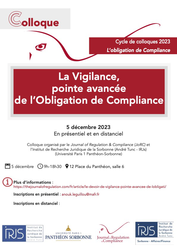
🌐suivre Marie-Anne Frison-Roche sur LinkedIn
🌐s'abonner à la Newsletter MAFR Regulation, Compliance, Law
____
► Référence complète : M.-A. Frison-Roche, "Articulation systémique entre Vigilance, Due Diligence, conformité et Compliance", in M. Mekki, M.-A. Frison-Roche et J.-Ch. Roda (dir.), La vigilance, pointe avancée de l'obligation de Compliance, Journal of Regulation & Compliance (JoRC) et Institut de Recherche Juridique de la Sorbonne (André Tunc - IRJS), Université Paris 1 Panthéon-Sorbonne, 12 place du Panthéon, salle 6, 5 décembre 2023.
____
🧮consulter le programme complet de cette manifestation
____
🚧lire le document de travail bilingue sur la base duquel la conférence a été élaborée
____
consulter les slides accompagnant la conférence
____
► Résumé de la conférence :
____
Cette conférence sera suivie d'un article qui sera publié dans l'ouvrage L'obligation de Compliance.
________
Oct. 19, 2023
Thesaurus : Doctrine

► Référence complète : J.-L. Gaffard & G. J. Martin (dir.), Droit et économie de la transition écologique. Regards croisés, Mare & Martin, coll. "Mare & Martin", 2023, 168 p.
____
____
____
► Résumé de l'ouvrage (fait par les auteurs) : "La transition écologique ne se décrète pas, elle se construit pas à pas. Le caractère irréductible de la contradiction entre activité humaine et préservation des éléments naturels ne saurait conduire à nier la complexité des rapports économiques et sociaux nécessaires pour y survivre. Au lieu d'énoncer un discours de vérité absolue que détiendrait un État omniscient ou le libre marché, le propos du présent ouvrage est d'ouvrir un débat démocratique dont l'objet est d'organiser le dissensus et de cultiver le compromis nécessaire pour rendre la transition viable. Pour répondre à ce défi, un regard croisé du Droit et de l'économie s'impose qui permet de souligner aussi bien la pluralité des ordres juridiques et des espaces normatifs que celle des ordres économiques au coeur desquels se trouve l'entreprise.".
________
Oct. 5, 2023
Thesaurus : Doctrine
► Référence complète : M. Fabre-Magnan, "Les abus de la pornographie. Sanction et prévention par la nullité du contrat", D. 2023, pp.1707-1715
____
► Résumé de l'article (fait par l'auteure) : "S'il est difficile, en l'état des moeurs, de prohiber toute forme de pornographie, l'exception artistique ne peut justifier les graves violences, humiliations et abus envers les femmes que donnent à voir la plupart des films contemporains. Le contenu des contrats ayant pour objet de tels actes est, sinon contraire aux bonnes moeurs, au moins illicite. Cette nullité objective est une sanction certes insuffisante mais efficace : elle permet notamment d'éviter d'aller sur le terrain instable du consentement et aussi de rendre nulles et de nul effet toutes les cessions de droit à l'image stipulées, sans empêcher bien sûr le paiement d'une juste rémunération si certaines prestations ont déjà été exécutées.".
____
🦉Cet article est accessible en texte intégral pour les personnes inscrites aux enseignements de la Professeure Marie-Anne Frison-Roche
________
July 13, 2023
Thesaurus : Doctrine
► Référence complète : N. Ida, "Contrat et devoir de vigilance des sociétés", JCP E, n° 28, 13 juillet 2023, pp.17-26.
____
► Résumé de l'article (fait par l'auteur) : "Le contrat constitue l’instrument indispensable de déploiement de la vigilance sociale et environnementale dans les « chaînes de valeur » des sociétés donneuses d’ordre. Pourtant, la loi n° 2017-399 du 27 mars 2017 sur le devoir de vigilance des sociétés mères et entreprises donneuses d’ordre n'évoque pas le contrat, dont les liens avec le devoir de vigilance ont en conséquence été peu étudiés. Ce silence étonne car les sociétés concernées ne peuvent exercer leur devoir légal qu’en devenant créancières d’obligations de vigilance au moyen de clauses insérées dans leurs contrats commerciaux. Cette vigilance contractuelle imposée par la loi et bientôt par la directive européenne en cours d’adoption ne pourra atteindre son but qu’à la condition d’adapter les clauses de vigilance aux spécificités des relations contractuelles entretenues avec les fournisseurs et sous-traitants des sociétés donneuses d’ordre.".
____
🦉Cet article est accessible en texte intégral pour les personnes inscrites aux enseignements de la Professeure Marie-Anne Frison-Roche
________
June 28, 2023
Newsletter MAFR - Law, Compliance, Regulation

♾️suivre Marie-Anne Frison-Roche sur LinkedIn
♾️s'abonner à la Newsletter MAFR Regulation, Compliance, Law
____
► Référence complète : M.-A. Frison-Roche, "S'engager n'est pas contracter (décision du Conseil d'État du 21 avril 2023, Orange c/ Arcep)", Newsletter MAFR Law, Compliance, Regulation, 28 juin 2023.
____
📧Lire par abonnement gratuit d'autres news de la Newsletter MAFR - Law, Compliance, Regulation
____
🔴Engagements, acceptation, convention : multiplication de ces actes de volonté acceptés qui ne sont pourtant pas des contrats et échappent à leurs principes
Dans sa décision du 21 avril 2023, société Orangec/ Arcep, le Conseil d'État dit ce que ne constitue pas les engagements souscrits par l'opérateurs pour le déploiement de la fibre, acceptés par le ministre : ce n'est pas un contrat. La "qualification négative" est donc donnée. Mais alors qu'est-ce que c'est ?
____
📧lire l'article ⤵️

June 21, 2023
Publications

♾️follow Marie-Anne Frison-Roche on LinkedIn
♾️subscribe to the Newsletter MAFR Regulation, Compliance, Law
____
► Full Reference: M.-A. Frison-Roche, Conditions required to promote the "contractualisation" of the Law, Working Paper, June 2023.
____
🎤This Working Paper has been done as a basis for the closing conference of the colloquia La contractualisation du droit. Acte II, organised by the Société de législation comparée (SLC) and the Procuradoria Geral do Estado do Rio de Janeiro (PGE-RJ), on 19, 20 and 21 June 2023.
____
📝It is also the basis of the article that will be published.
____
► English Summary of the Working Paper :
____
🔓read the Working Paper⤵️
June 21, 2023
Conferences

♾️follow Marie-Anne Frison-Roche on LinkedIn
♾️subscribe to the Newsletter MAFR Regulation, Compliance, Law
____
► Full Reference: M.-A. Frison-Roche, "Favoriser ou pas la « contractualisation » du Droit" ("To favour or not the "contractualisation" of the Law"), final speech in Société de législation comparée (SLC) and Procuradoria Geral do Estado do Rio de Janeiro (PGE-RJ), La contractualisation du droit. Acte II, Paris, 21 June 2023.
____
🧮See the full programme of this event (in French).
The conference is held in French
________
May 31, 2023
Thesaurus : 06.1. Textes de l'Union Européenne
► Full Reference: Regulation (EU) 2023/1115 of the European Parliament and of the Council of 31 May 2023 on the making available on the Union market and the export from the Union of certain commodities and products associated with deforestation and forest degradation and repealing Regulation (EU) N° 995/2010.
____
________
May 17, 2023
Thesaurus : Doctrine
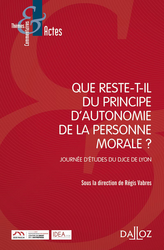
► Référence complète : Th. Favario, "Autonomie de la personnalité morale et devoir de vigilance", in R. Vabres (dir.), Que reste-t-il du principe d'autonomie de la personne morale ? - Journée d'études du DJCE de Lyon, coll. "Thèmes & Commentaires", Dalloz, 2023, pp.103-112.
____
► Résumé de l'article :
____
🦉Cet article est accessible en texte intégral pour les personnes inscrites aux enseignements de la Professeure Marie-Anne Frison-Roche
________
May 17, 2023
Thesaurus : Doctrine

► Référence complète : R. Vabres (dir.), Que reste-t-il du principe d'autonomie de la personne morale ? - Journée d'études du DJCE de Lyon, coll. "Thèmes & Commentaires", Dalloz, 2023, 250 p.
____
____
____
► Résumé de l'ouvrage (fait par l'auteur) : "Principe cardinal du droit des personnes et vecteur de sécurité juridique, l'autonomie de la personne morale est un pilier de notre système juridique. Il est au coeur du droit des obligations dès lors qu'il participe à l'identification du débiteur de l'obligation, du droit patrimonial en ce qu'il favorise de nombreuses opérations de gestion ou de transmission ou encore du droit de l'entreprise.
Ce principe connaît toutefois de profondes remises en cause dans plusieurs branches du droit. Une approche économique, s'extirpant de la réalité juridique, tend en effet à se disséminer dans de nombreuses situations et cela afin de préserver d'autres intérêts et poursuivre des objectifs jugés prioritaires.
L'atténuation de la distinction entre une entreprise individuelle et une société dotée de la personnalité morale, le maintien de la responsabilité pénale en dépit d'une fusion, la mise en oeuvre de la responsabilité d'une société en raison des actes commis par sa filiale sont autant de manifestations invitant à redéfinir l'étendue de l'autonomie de la personne morale.
Cet ouvrage réunit les contributions d'universitaires, en droit des contrats, droit du patrimoine, droit des sociétés, etc. sur des thèmes actuels et faisant écho à des évolutions législatives et jurisprudentielles importantes sur les plans théorique et pratique.".
________
Feb. 8, 2023
Publications
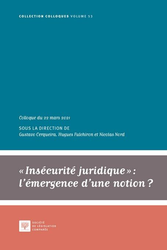
🌐follow Marie-Anne Frison-Roche on LinkedIn
🌐subscribe to the Newsletter MAFR Regulation, Compliance, Law
____
► Full Reference: M.-A. Frison-Roche, "Instaurer l'insécurité juridique comme principe, outil de prévention des crises systémiques catastrophiques totales" ("Establishing legal uncertainty as a principle and a tool for preventing total catastrophic systemic crises"), in G. Gerqueira, H. Fulchiron et N. Nord (eds.), Insécurité juridique : l'émergence d'une notion ?, Société de législation comparée, coll. "Colloques", vol. 53, 2023, pp. 153-167.
___
📝read the article (in French)
____
🚧read the bilingual Working Papier which is the basis of the conference and this article
____
🎤watch the conference of March 22, 2021 that took place in the Cour de cassation (French Court de cassation) and for which this reflection was globally led
____
► English Summary of the article: "whatever it takes". In 2015, Mario Draghi used this formula to aim for the defence of the European currency, when the Euro was in danger of collapsing under the dance of the speculators who would be enriched by its collapse. Rarely has a formula been more violently political and more strongly prescriptive. It contributed to his being dubbed "Super Mario", as in the video game. The formula was used again in 2020 by the Président de la République Française (President of the French Republic) in the face of the financial turmoil caused by the health crisis that led to similar calculations. It goes beyond the mere "financial cost". With this formula, the President of the European Central Bank stated that the economic crisis in Europe was such that the institution would do everything in its power to put an end to it, without any limits; that all those who, by their behaviour, even supported by their legal prerogatives, in this case the speculators, because they were destroying the economic and financial system, would come up against this and would themselves be swept away by the Central Bank because the latter's mission, in that it is absolutely to safeguard the Euro itself, would prevail "quoi qu'il en coûte" ("whatever the cost"). At one point, the master stood up. If the royal position is the seated position, when he listens and judges, it is by rising that he shows his acceptance of also being the master, because he is in charge of more and will use everything to win.
More broadly, we might consider drawing up a positive concept of legal uncertainty (which is bound to please the Hegelians), increasing legal certainty: this would make it possible to associate a clearer legal regime with the hypotheses of legal uncertainty. Indeed, rather than sweeping Law under the carpet, which explains many of the tensions between the Conseil constitutionnel (French Constitutional Council) and the Conseil d'État (Council of State) on the one hand, and the legislator and the government on the other, concerning the "État d'urgence" ("State of emergency"), we could set out the conditions in which legal uncertainty makes it possible to set aside or limit rules.
The idea proposed is therefore that in "extraordinary situations", legal uncertainty would be a dimension, or even a principle which would be admissible. And developing this first point, it is proposed that the hypothesis of an "economic crisis" justifies a dimension, or even a principle of "legal uncertainty". But this first assertion needs to be tested. Is an economic crisis, a concept that needs to be defined, if it is to have such a major reversal effect, such an extraordinary 'situation'? Furthermore, to deal with this extraordinary situation constituted by an 'economic crisis', how much legal uncertainty would be legally acceptable, or even legally claimed? Could we even conceive of a reversal of principle that would bring applicable Law to an economic crisis under the aegis of legal uncertainty? In such a case, the question that then arises is to determine the conditions and criteria for emerging from the economic crisis, or even to determine the elements of perspective of an economic crisis, which could justify in advance the admission of an injection of legal uncertainty. Above all, Law has control over the future.
The economic crisis should therefore be legally defined as an exceptional situation, before stressing that Regulation and Compliance Law, because on the one hand we move from crisis to crisis and on the other hand the whole system aims to avoid and manage the future crisis in advance or to exclude it; this is particularly true of health and climate issues (the way the health crisis was managed was to 'decree' that the State should initiate an economic crisis), which means that legal insecurity is no longer seen as a distant exception, a failure to be combated, but as a lever that can be used to influence the future.
________